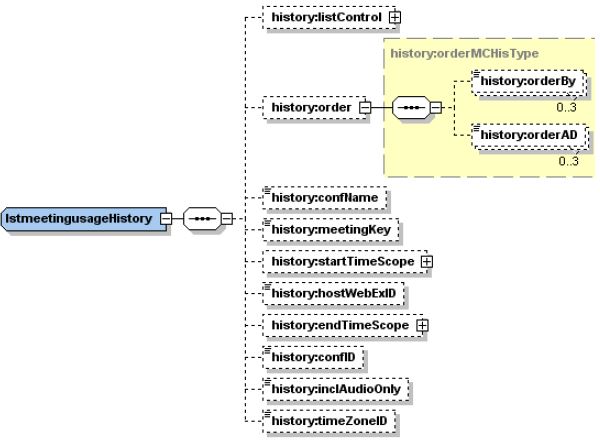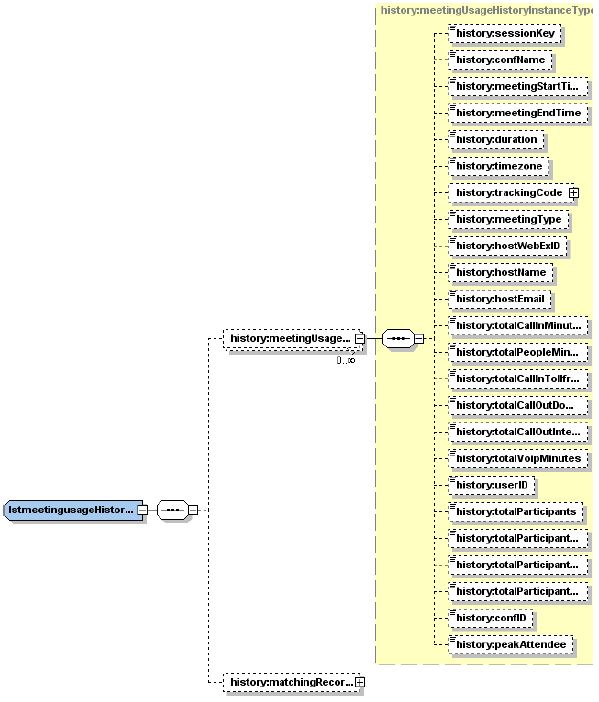LstmeetingusageHistory
Allows meeting hosts or site administrators to request detailed usage
data for previously hosted meeting sessions. This command enables
external users and third-party systems to prepare flexible usage reports
in formats other than WebEx online reports.
Note A host can only access his or her own meeting history, but a site administrator can access the history of all the meetings hosted on his or her site. When a site administrator specifies a hostWebExID, the system will return the data of the specified host’s meetings; if a hostWebExID is not specified, all the meetings on his or her site will be returned. If you are not a site administrator, the element hostWebExID will be ignored.
Request
The sample XML document shows an example of a request for all meetings the user hostid has previously hosted.
<?xml version="1.0" encoding="UTF-8"?>
<serv:message xmlns:xsi="http://www.w3.org/2001/XMLSchema-instance">
<header>
<securityContext>
<webExID>hostid</webExID>
<password>hostpassword</password>
<siteID>0000</siteID>
<partnerID>9999</partnerID>
<email>johnsmith@xyz.com</email>
</securityContext>
</header>
<body>
<bodyContent xsi:type=
"java:com.webex.service.binding.history.LstmeetingusageHistory">
<startTimeScope>
<sessionStartTimeStart>03/29/2004 00:42:34
</sessionStartTimeStart>
<sessionStartTimeEnd>03/29/2004 04:42:34</sessionStartTimeEnd>
</startTimeScope>
<endTimeScope>
<sessionEndTimeStart>03/29/2004 02:42:34</sessionEndTimeStart>
<sessionEndTimeEnd>03/29/2004 05:42:34</sessionEndTimeEnd>
</endTimeScope>
<listControl>
<serv:startFrom>1</serv:startFrom>
<serv:maximumNum>10</serv:maximumNum>
<serv:listMethod>OR</serv:listMethod>
</listControl>
<order>
<orderBy>CONFNAME</orderBy>
<orderAD>ASC</orderAD>
</order>
</bodyContent>
</body>
</serv:message>
The following schema diagram shows the structure of the elements in the lstmeetingusageHistory request message.
Figure 9-7 • Schema diagram for lstmeetingusageHistory
For descriptions of the global elements in the security context of the header, please see Global Request Elements in Security Context. For descriptions of the non-global elements, please refer to “Elements in WebEx XML Schema Definitions for the History Service”.
Response
The sample XML document shows an example of a possible response to the preceding request document.
<?xml version="1.0" encoding="UTF-8"?>
<serv:message xmlns:serv="http://www.webex.com/schemas/2002/06/service"
xmlns:com="http://www.webex.com/schemas/2002/06/common"
xmlns:history="http://www.webex.com/schemas/2002/06/service/history">
<serv:header>
<serv:response>
<serv:result>SUCCESS</serv:result>
<serv:gsbStatus>PRIMARY</serv:gsbStatus>
</serv:response>
LstmeetingusageHistory
</serv:header>
<serv:body>
<serv:bodyContent xsi:type="history:LstmeetingusageHistoryResponse"
xmlns:xsi="http://www.w3.org/2001/XMLSchema-instance">
<history:meetingUsageHistory>
<history:sessionKey>94036066</history:sessionKey>
<history:confName>java schedule for XML</history:confName>
<history:meetingStartTime>03/29/2004 02:42:34
</history:meetingStartTime>
<history:meetingEndTime>03/29/2004 02:49:20
</history:meetingEndTime>
<history:duration>7</history:duration>
<history:timezone>GMT-08:00, Pacific (San Jose)
</history:timezone>
<history:meetingType>PRO</history:meetingType>
<history:hostWebExID>xml</history:hostWebExID>
<history:hostName>xml</history:hostName>
<history:hostEmail>xml@sz.webex.com</history:hostEmail>
<history:totalCallInMinutes>0</history:totalCallInMinutes>
<history:totalPeopleMinutes>7</history:totalPeopleMinutes>
<history:totalCallInTollfreeMinutes>0
</history:totalCallInTollfreeMinutes>
<history:totalCallOutDomestic>0</history:totalCallOutDomestic>
<history:totalCallOutInternational>0
</history:totalCallOutInternational>
<history:totalVoipMinutes>0</history:totalVoipMinutes>
<history:userID>479422751</history:userID>
<history:totalParticipants>1</history:totalParticipants>
<history:totalParticipantsVoip>0</history:totalParticipantsVoip>
<history:totalParticipantsCallIn>0
</history:totalParticipantsCallIn>
<history:totalParticipantsCallOut>0
</history:totalParticipantsCallOut>
<history:confID>4702323</history:confID>
<history:peakAttendee>1</history:peakAttendee>
</history:meetingUsageHistory>
<history:matchingRecords>
<serv:total>1</serv:total>
<serv:returned>1</serv:returned>
<serv:startFrom>1</serv:startFrom>
</history:matchingRecords>
</serv:bodyContent>
</serv:body>
</serv:message>
The following schema diagram shows the structure of the elements in the lstmeetingusageHistoryResponse message.
Figure 9-8 • Schema diagram for lstmeetingusageHistoryResponse
The result and exceptionID global elements allow you to confirm that an instantiation request was successful. See Global Response Elements Showing Results and Errors.

